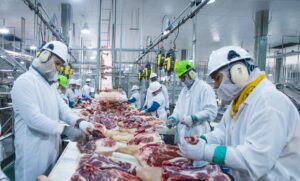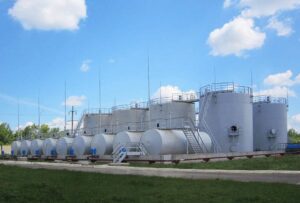
The investment company InVenture (Kyiv), acting in the interests of its client, intends to sell the Bavaria meat processing plant (village Fursy, Kyiv region) at an online auction with a starting price of $1.9 million with its estimated market value of $5 million, the company said on its website on Wednesday.
“The enterprise was built and launched in 2018. At the moment, the plant is mothballed. However, all production equipment is in good condition and is completely ready to resume being functional. Enterprise location: 5 km away from Bila Tserkva and 100 km away from Kyiv,” InVenture said.
According to it, the property complex includes: buildings and structures with a total area of 7,000 square meters, a plot of 14 hectares in private ownership, communications (electricity – 800 kW, gas, water, sewerage system with a working sewage pumping station). The sanitary and ecological standards are followed according to the national legislation.
According to the company, the facility was mothballed in 2019 due to a shortage of working capital and non-core activities of this area for its investor, who had previously planned the construction of a pig farm and a feed mill as part of the enterprise.
“At a distance of 1 km from the property complex of the meat processing plant, there is a site that was planned to be developed as a site for the construction of a pig farm with a pigsty for 1,200 sows and an annual keeping of 32,000 pigs. The project also planned the construction of a feed mill with a capacity of 5 tonnes per day and 4 silos for storing grain, 5 tonnes each,” InVenture said.
The enterprise has modern equipment, its capacity allows to produce smoked, semi-smoked, boiled-smoked and boiled sausages; deli meats, smoked meats, hams and baked meat; sausages and wieners; pates, stewed meat and brawn with a total volume of up to 15 tonnes of meat products per day. The slaughterhouse has a capacity of slaughtering and storing of 320 livestock per day.
The investment company clarified that the acceptance of bids from potential buyers will last until October 15, the announcement of the winners – October 24, and the sale of the asset is planned to be fully completed by December 24, 2021. The estimated market value of the meat processing plant is $5 million, and the starting bidding price for accepting applications is $1.9 million.

The adoption of a law simplifying the procedure for privatization and lease of state property will be a signal for investors, including international ones, Deputy Head of the Parliamentary Committee on Economic Development Roksolana Pidlasa (Servant of the People faction) said.
“This bill [No. 4572] will become a green light for investors, including international ones. And it will also contribute to the development of regions, because after its adoption, the budgets of communities will receive funds not only from the privatization of municipal enterprises, but also 10% of the funds received from the sale of state assets,” Pidlasa told Interfax-Ukraine.
She recalled that the Verkhovna Rada has already adopted the bill at the first reading and currently the Committee on Economic Development is preparing it for the second reading.
The MP stressed that “it is privatization that gives people the opportunity not to go strawberry-picking in Poland, but to have a decent job in Ukraine, in their community.” “Hundreds of enterprises and production sites that have been abandoned and forgotten for decades and would hardly ever resume work are bought by private investors and they turn them into modern enterprises where Ukrainians are working now,” Pidlasa said.
The MP recalled that over the past year and a half, the State Property Fund returned ten key assets under state control, including the United Mining and Chemical Company, PJSC Centrenergo and JSC Odesa Port-Side Plant.
As reported, the Verkhovna Rada on July 15 adopted at the first reading bill No. 4572 on amendments to the law on the State Property Fund of Ukraine and other legislative acts promoting investment attraction in the process of privatization and lease of state and municipal property.

The growth of capital investments in Ukraine in April-June 2021 compared to the same period in 2020 amounted to 17.1%, while in January-March there was a decline in capital investments at the level of 9.5%, the State Statistics Service said.
According to the service, in the second quarter of this year, UAH 191.133 billion of capital investments were spent (excluding the temporarily occupied territory of Crimea, Sevastopol and the territories of Luhansk and Donetsk regions).
The growth of capital investments in the first half of the year compared to the same period in 2020 amounted to 4.2%, the State Statistics Service said.
In the regional context, a significant decrease in capital investments in the second quarter of 2021 compared to the same period in 2020 was recorded in Volyn (by 64.1%), Kirovohrad (by 17.1%), Mykolaiv (by 13.3%) regions.
Capital investments in April-June 2021 compared to April-June 2020 increased in Luhansk (by 9.08%), Zhytomyr (by 85.3%), Zaporizhia (by 66.7%), Ivano-Frankivsk (by 60.4%), Kherson (56.4%), Chernivtsi (57.1%), Lviv (47.9%), Sumy (41.7%), Vinnytsia (36.1%), Rivne (by 37.5%), Donetsk (by 34.3%), Kyiv (by 27.1%), Dnipropetrovsk (by 26.2%), Chernihiv (by 22.3%), Cherkasy and Ternopil (by 22.2%), Khmelnytsky (by 15.7%), Zakarpattia (by 13.3%), Odesa (by 13%), Kharkiv (by 12.7%), Poltava (by 10.8%) regions and in Kyiv city (by 10.2%).
Among industries, the growth of capital investments in the second quarter of this year was recorded in the field of forestry – 4.4 times, the provision of other types of services – 3.9 times, in postal and courier activities – 3.6 times, healthcare and social assistance – 2.5 times, at transport enterprises, in warehouses, postal and courier activities – by 60.8%, in temporary accommodation and catering – by 27.7%, in real estate transactions – by 25.9%, in wholesale and retail trade – by 25.3%, in activities in the field of administrative and support services – by 16.3%, computer programming and the provision of other information services – by 14.8%, in industry – by 14.1%, agriculture – by 13.1%, construction – by 7.6%, scientific achievements and developments – by 5%, public administration and defense – by 3.8%, advertising – by 1.2%.
In the field of fish farming, the decline in capital investments was 43.3%, in financial and insurance activities – by 37.7%, in education – by 29%, in professional, scientific and technical activities – by 5.5%, in the field of information and telecommunications – by 4.3%.
Own funds of enterprises and organizations remained the main source of financing for capital investments, at the expense of which 75.2% of the total volume of all investments has been used.
A significant share of capital investments was invested in buildings and structures – 45.5%, and in machinery, equipment and vehicles – 44.9% of all investments.
As reported, capital investment in Ukraine in 2020 fell by 38.2%, while in 2018-2019 they grew by 16.4% and 15.5%, respectively.

The rental price of apartments in Kyiv, Kharkiv and Dnipro in August 2021 increased by an average of 3% compared to spring, in Odesa – by 5%, and in Lviv – by 2%, according to the OLX Real Estate analytical service.
“If last year, after the first lockdown and until the fall, rental prices in Kyiv decreased by 6-9%, then in 2021 the situation is different: housing prices are growing. Compared to April, long-term rent in Kyiv has risen by 3%,” according to the OLX press release.
According to the service, the largest drop in rental prices for apartments was recorded in Kyiv. The average prices for one-room apartments in Kyiv vary on average from UAH 7,000 to UAH 16,000, for two-room apartments – UAH 8,000-UAH 30,000, and three-room apartments – UAH 11,000-UAH 55,700. The highest rates are kept by apartments in Pechersky district. At the same time, the lowest rental prices remain in Desniansky district: UAH 7,000 – for a one-room apartment, UAH 8,000 – for a two-room apartment, and UAH 11,000 – for a three-room apartment.
According to analytical data, in Kharkiv, the cheapest housing for rent is offered in Industrialny, Nemyshliansky, Novobavarsky and Moskovsky districts, where prices for one-room apartments are UAH 5,000-UAH 5,500, two-room apartments – UAH 6,000-UAH 7,000, and three-room apartments – UAH 7,000-UAH 9,000. At the same time, the highest prices remain in Shevchenkivsky district – on average 50% higher than in remote residential areas.
In Dnipro, the average rental price for a one-room apartment is UAH 5,000-UAH 8,000, for a two-room apartment – UAH 6,000-UAH 12,000, and for a three-room apartment – UAH 7,000-UAH 13,000. The lowest prices were recorded in Samarsky district: UAH 4,000, UAH 5,000 and UAH 8,000, respectively.
According to OLX, Lviv has the smallest difference in rental prices between apartments in central and remote areas. So, the rental prices for a one-room apartment vary within UAH 7,000- UAH 8,000, two-room apartments – UAH 8,000-UAH 10,000, and three-room apartments – UAH 8,500-UAH 12,500.
According to the company, Odesa has the lowest prices for long-term rent among cities with a population of over one million. This is due to the decline in the tourist season. Thus, the average rental prices for a one-room apartment are UAH 5,500-UAH 7,000, for a two-room apartment – UAH 6,000-UAH 8,500, and for a three-room apartment – UAH 7,000-UAH 9,500.
At the same time, as we get closer to the sea, prices in Odesa increase: one can rent a one-, two- and three-room apartment in Prymorsky district for UAH 8,500, UAH 12,000 and UAH 19,300, respectively.

NJSC Naftogaz Ukrainy is studying the issue of building a tank farm for storing strategic reserves of oil and petroleum products at the site of the Pivdenny maritime oil terminal (Odesa region), the company said in a press release published on August 20 with reference to acting CEO Yuri Vitrenko who spoke about it during his trip to the site on 19 August.
“The terminal where we are now is a critical element of the oil transmission system of Ukraine with a huge potential for development. We intend to develop it to boost the reliability of supplying Ukraine with oil. This is an extremely important platform for creating a strategic oil reserve,” he said.
At the same time, Vitrenko said that the strategic oil reserve is necessary both in accordance with European rules and in view of the fact that Ukraine is actually in a state of war with Russia, and still does not have a strategic oil and oil products reserve.
According to the head of Naftogaz, at the first stage it is about the construction of a reservoir for strategic reserves with a capacity of about 120,000 tonnes at the Pivdenny maritime oil terminal site. In general, the first stage of the project may include the construction of up to four tanks.
Pivdenny maritime oil terminal is connected to the Druzhba oil trunk pipeline system near the city of Brody (Lviv region) through the Odesa-Brody pipeline with a length of 674 km and an annual capacity of 9 million tonnes. It was launched in 2001.
MARITIME TERMINAL, PIVDENNY, STORING, STRATEGIC OIL, TANK FARM